- Home
- James Swain
The Man Who Cheated Death (Vincent Hardare) Page 10
The Man Who Cheated Death (Vincent Hardare) Read online
Page 10
He climbed the stairs knowing he was too late.
He found Corey upstairs in their bedroom. Death had ripped her clothes off, used nylon stockings to tie her wrists to the headboard of their bed, and slit her throat from ear to ear.
He found my son’s dismembered body in his room down the hall, the stereo turned up to a deafening roar. On the wall of his son’s room was a huge map of the United States. In blood Death had scrawled Everyone Dies!
He found his daughter in the bathroom, drowned in the toilet, the bottom of her bikini pulled down to her knees.
“Looking for me, Harry?” he heard a voice ask.
Wondero gently laid his daughter’s body on the bathroom floor and moved into the hall. Death stood at the other end, a 12 gauge shotgun cradled in his arms, rocking it like a baby. Wondero charged him as if fired out of a cannon, no longer caring about his own welfare, and saw the tiny ball of flame leave the gun’s barrel even before he heard the gun’s violent retort.
“What happened then?”
“Corey woke me up.”
“Have some water.”
Wondero took a sip of Evian. “Thanks.”
“What did Death look like?”
“Same as before,” Wondero said. “No hair, no eyebrows, pale white skin, really strange eyes.”
“Did anything about him stand out from the previous dreams?”
“He had this look on his face.”
“Can you describe it?”
“Gleeful. He was having the time of his life.”
His psychiatrist scribbled in the log he had kept of Wondero’s reoccurring nightmares, the entries dating back six months to when the dreams had first started, and Wondero had suspected he was beginning to lose his mind.
“Anything else?” Dr. Kaufman asked.
“It was like I told you before,” Wondero said. “It didn’t feel like a dream. It was all very real: the grill, the kids horsing around, the dog, I could even smell the burgers cooking. Most of my dreams are goofy, or have things out of context. Like I’m at the office walking around in my underwear and nobody says anything. This dream wasn’t like that. It was like watching a home video.”
His psychiatrist gave him a perplexed look. “Except none of those things you described have happened.”
“No,” Wondero said.
“Then it was a dream. Your subconscious is making you dream of this faceless man in response to your inner torment of not being able to catch this killer. It’s a common occurrence for people under stress.”
“I don’t know,” Wondero admitted, finishing his water.
“Don’t know what, Harry?”
“I feel like… I’m being warned.”
Kaufman gave him a measured stare, then glanced obliquely at his wristwatch, scowled dejectedly, and stood up. For the second time in as many weeks they had run over and squandered another patient’s precious minutes.
“Still fit for service?” Wondero said.
“I think so,” Kaufman said, showing him to the door.
“See you next week.”
Rittenbaugh was hurrying through the lobby of the station house as Wondero came in, and grabbed Harry by the arm.
“I think we hit pay dirt,” Rittenbaugh said.
His partner did not explain until they were in the car, weaving through traffic. “Last night a homeless guy found a hooker in a garbage can with a knife stuck in her chest. He called an ambulance, and they took her to Hollywood Community and hooked her up to life support. Cop at the hospital searched the hooker’s clothes for ID, and realized the homeless guy had cleaned her out. He tracked the homeless guy down on Sunset Strip this morning, and busted him.”
“I’m sure there is a moral to all of this,” Wondero said.
“There is. The homeless guy admitted he rolled the victim, and produced a note he found in her pocket. It’s from Death.”
A dilapidated pick-up sliced through two lanes of traffic, cutting them off. When Rittenbaugh punched the horn, the pony-tailed driver gave them the finger, and they simultaneously flashed their badges.
“Get a haircut,” Rittenbaugh yelled as they passed.
“Is the hooker still alive?”
“Yeah. He finally missed.”
“What’s her name?”
“Tawny Starr.”
“Has it hit any of the papers?”
“She’s a hooker, Harry,” Rittenbaugh said, turning into the hospital parking lot. “It won’t get noticed unless we release the note. The bad news is she’s in rough shape.”
“Can she talk?”
“I don’t think so.”
The black plastic mask that covered Tawny Starr’s nose and mouth reminded Wondero of a piece of outdated scuba equipment. A metal lung hung beside the bed, pumping oxygen into her chest. Her eyes looked tired and old, as if in the past few hours her internal clock had sped up, and her whole life had slipped by.
Beside the bed sat an Asian police artist doing a pencil sketch on a white pad. He paused to display his work. Her glassy eyes studied the sketch, and blinked heavily.
Wondero got behind the artist and had a look. The drawing showed a homely man in his mid-thirties with flared nostrils and a low forehead. A Dodgers cap covered most of his head, and a pair of glasses disguised his face. What set him apart were his eyes. They were a maniac’s eyes, and bulged out of his head. He also did not appear to have eyebrows, and Wondero wondered if this was intentional, or if the artist was planning to charcoal them in.
He went into the hall. Rittenbaugh was grilling the uniform who’d brought the victim in.
“This is Detective Harry Wondero,” Rittenbaugh said. “Harry, meet Ben Jackson. Ben, would you mind repeating what you just said?”
“Sure.” Jackson tilted his styrofoam cup, tapping out the last drop of coffee with his finger. “Like I told your partner, EMS thought she was dead, her pulse was so low. As she was being put in the ambulance, her eyes popped open, and she started talking. I asked her if she saw the guy who stabbed her, and she gives me this awful stare and whispers “He looked like you.” I said, “Like me?” and she says, “With a baseball cap.” So I said, “Do you remember anything else?” and she says, “He had schoolbooks.” Then I heard her say, “Red Warrior.” Then she passed out.”
Listening to him speak, Wondero knew Jackson was a rookie. That was why he had hung around the hospital, instead of filling out a report and going home to sleep, or to his other job.
“What do you think she meant?” Rittenbaugh asked.
“I wish I knew,” Jackson said.
Wondero said, “Were there any witnesses?”
“She was dumped behind the Las Palmas hotel. Plenty of people were around, only no one saw a thing.”
Wondero stared down the empty hospital corridor. How many times had it happened? How many times had the woman living next door sworn she’d seen nothing? Or the man walking his dog hadn’t heard a sound. Or the party of teenagers on the beach thought the screams were gulls fighting over garbage brought in by the tide.
Without another word, Wondero walked back into the victim’s room. Rittenbaugh slapped Jackson’s shoulder.
“Thanks a lot. I appreciate your hanging around.”
“I hope it helps,” the uniform said.
“Everything helps,” Rittenbaugh told him.
The police artist was finishing up as Wondero entered the room. Tawny Starr had shut her eyes and her breathing had grown shallow. Wondero picked up the clipboard hanging from her bed. Her real name was Tawny Starkowski, hometown unknown. He glanced at her birth date. Seventeen. The same age as his daughter.
Wondero said, “Did you show her the sketch?”
“Afraid not. She went under right after you left the room,” the artist said.
He hung the clipboard back on the railing. If Tawny didn’t point at the sketch, utter the words “That’s him!” or say something similar in front of a reliable witness, than what she’d told Jackson was worthless.
/>
A female doctor entered the room along with a nurse. The doctor took Tawny’s pulse and lifted one of her eyelids.
“Is there any chance she’ll come back around?” Wondero asked.
“You must be the police,” the doctor said.
Wondero felt like he’d been slapped in the face. “I need to speak with her. She may be able to help us catch a killer.”
“Not today.” She scribbled away on the clipboard hanging from Tawny’s bed.
“Please answer my question,” Wondero said.
“It’s not in my hands anymore.”
She spoke to the nurse, who quickly left the room.
“Yes, or no,” Wondero said.
“You don’t let up, do you?”
Wondero waited her out.
“All right. No, I don’t think she’ll recover. It’s a miracle she’s lasted this long.”
“Thank you. I appreciate your professional opinion.”
“Oh, go to hell,” the doctor said.
Wondero and his partner went to a a doughnut shop two blocks from the hospital where, two hours before, there had been an armed robbery. The store manager still wore the shocked expression of someone who had seen his life flash before his eyes, and been angered by the futility of it. He banged the register shut and slapped their change onto the counter. They hid in the rear of the store, eating grape jelly doughnuts and drinking coffee.
“We need to release the sketch to the media,” Wondero said.
“Can’t,” his partner said. “The victim never confirmed it.”
“We can say she did.”
“Who will back us up? Not Jackson, and not the police artist. It’s a bad idea, Harry.”
“But we know what he looks like. If we put the sketch out there, and someone sees it, they might identify him.”
“We’ve got to play by the rules, Harry.”
Wondero sucked down the rest of his coffee. “I’ve got another idea.”
“Oh, boy.”
“Just listen. We know a more about Death than we did before. We have a vague idea what he looks like, and we know that last night he was driving around the strip impersonating a college student. What makes this significant is this. Death doesn’t know that we know. He thinks he killed Tawny Starr.”
“I don’t see how that helps us, Harry.”
“We give the sketch to Hardare.”
“I’m not reading you.”
“We take him to the scene of the crime. Bring reporters. Let him do the psychic number. He draws the sketch, and says this is what the killer looks like. The newspapers won’t have any problem printing it then.”
Rittenbaugh buried his head in his hands. “You’re sounding like something straight out of the nut house.”
“Hardare scared him once,” Wondero insisted. “He can do it again. We have to use the sketch.”
“It’s one thing to bend the rules, it’s another when you break them.”
“Bad deeds, good intentions.”
“I suppose you think one balances the other.”
“I wouldn’t stay on the force if I did. But in this situation, I think it’s warranted.”
Rittenbaugh licked the jelly off his finger. “I think you’re wrong, Harry. But if you want me to play along, I’m game.”
“You will?”
“Sure. You’ve backed me up when I’ve been wrong.”
Wondero stared into space. He could not rid himself of the image of Death running amuck in his house, butchering his family. Only now he saw himself standing in the bathroom doorway, blocking the path to his daughter. In his hands was a long gleaming sword, and although it was no match for Death’s shotgun, he was able to take a full swing just before the gun went off, and felt it sever flesh and bone.
Chapter 12
Ebell
The Wilshire Ebell Theater was known simply as the Ebell to the people of Los Angeles, and had been showcased a wide variety of live performances for nearly a hundred years. Wondero drove straight to the theater with his partner, and parked on Lucerne next to the ornate building. Inside, he found the two detectives assigned to bodyguard Hardare and his family in the lobby.
“What are you doing out here?” Wondero asked them.
“Hardare’s doing a dress rehearsal, and doesn’t want to be disturbed,” one of the detectives replied.
“Did you check the other entrances to make sure they were secure?”
“Sure did. The place is locked down.”
“Good.”
Wondero headed into the theater when his partner stopped him.
“He doesn’t want to be disturbed, Harry,” Rittenbaugh said.
“I didn’t hear that,” Wondero said.
Wondero pushed open a swinging door and entered the darkened theater. He had no idea what he was going to say to Hardare, and decided to just wing it. Walking down a center aisle, he heard music, then saw a spotlight come on, revealing an empty stage. The dress rehearsal had started, and he stopped to watch.
There was a puff of smoke in the center of the stage, and Hardare appeared out of thin air. He wore a European cut tuxedo with pleated pants, a white shirt with a starched collar, and black onyx and gold cufflinks that caught the light and made it sparkle in tiny pools around his hands. He looked at ease, at home within his fishbowl, his smile broadening at the rows of seats stretched out before him. He addressed the empty house.
“During the 1920’s, Houdini became engrossed in the spirit world while attempting to contact his beloved mother,” he began. “What he found in his search was something else entirely, and can be viewed here on this stage.”
The spotlight expanded, illuminating the innocent props that Wondero swore had not been there moments before: a black chair with a curved back, a black curtained cabinet six feet high and no wider than a phone booth, and a leather restraining device called a Kansas vest that hung on the back of the chair.
“I need the assistance of a member of the audience. You sir,” Hardare said, pointing at an empty seat in the front row. “Would you care to step forward?”
“Sure thing,” Wondero said loudly. Walking down the aisle, he climbed up the felt lined stairs to the stage. Frozen to his spot, Hardare’s eyes slowly registered on his face.
“For God’s sake, don’t do that,” Hardare said.
“I’m sorry. I didn’t mean to scare you.”
“Here,” Hardare said, throwing the Kansas vest into his hands. “I needed someone to help me anyway.”
“Can we talk first?” Wondero asked.
“Lets do both. I’ve got two union guys doing the lights and they get paid whether I work them or not.”
Wondero stretched the vest between his arms, and tested the straps to see if they were authentic. A Kansas vest — when coupled with a regulation pair of handcuffs to keep a prisoner’s hands from wandering — could not be escaped from. He fitted Hardare into the garment and did up the back.
“There is a pair of handcuffs on the table,” Hardare said. “Inspect them if you wish, and clamp them around my wrists.”
Wondero looked the cuffs over. “Look fine to me,” and as he turned, slipped them into his pocket while his other hand unsnapped the pair hanging on his belt. He clamped them on Hardare’s wrists, hoping he could not tell the difference.
“Thank you,” Hardare said enthusiastically, his stage persona on full wattage. “Directly behind me is a cabinet. Please open the curtain, step inside, and have a look around.”
Wondero drew the curtain and inspected the prop. With his car keys, he pried at several boards in the floor until he was sure they were not hinged.
“Everything’s copacetic.”
“Ladies and gentlemen, let’s give Detective Wondero a big hand for doing such a thorough job,” Hardare said.
The silence was deafening. Sensing he was making a jerk out of himself, Wondero said, “Sorry.”
Hardare entered the cabinet. Wondero drew the curtain for him, and noticed it was missin
g a foot of fabric at its top, leaving Hardare’s head plainly visible.
“Please step back. Just a few feet.”
Wondero obliged hm. The lights on the stage dimmed while a pin light focused on Hardare’s grinning countenance. From behind the curtain a familiar looking silver pen appeared, and danced up to Hardare’s face, where the magician clasped it between his teeth.

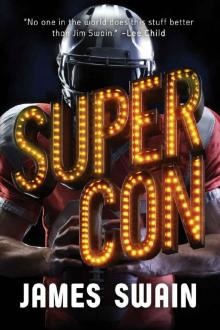 Super Con
Super Con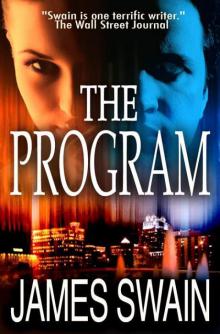 The Program
The Program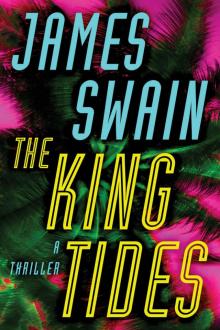 The King Tides (Lancaster & Daniels Book 1)
The King Tides (Lancaster & Daniels Book 1)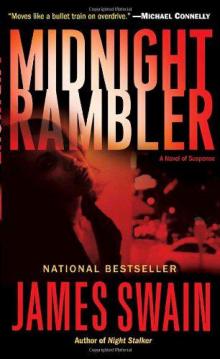 Midnight Rambler
Midnight Rambler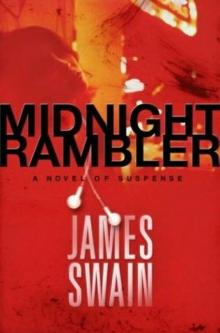 Midnight Rambler jc-1
Midnight Rambler jc-1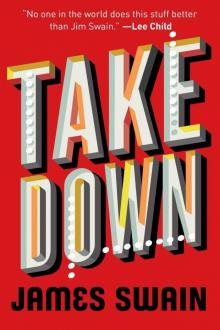 Take Down
Take Down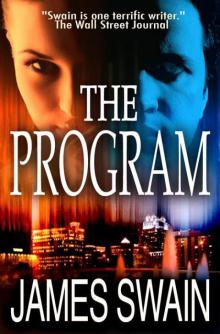 The Program (Jack Carpenter series)
The Program (Jack Carpenter series)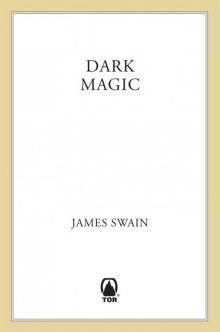 Dark Magic
Dark Magic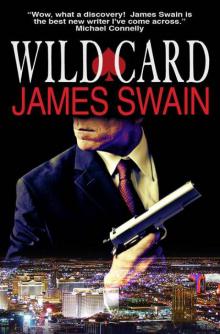 Wild Card (Tony Valentine Series)
Wild Card (Tony Valentine Series)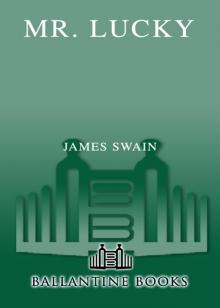 Mr. Lucky
Mr. Lucky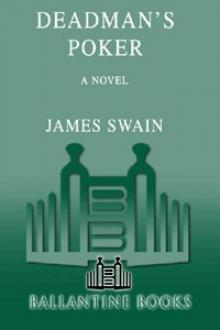 Deadman's Poker: A Novel (Tony Valentine)
Deadman's Poker: A Novel (Tony Valentine)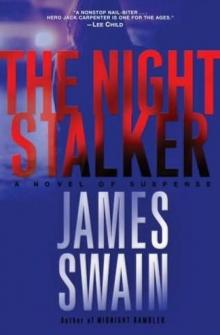 The Night Stalker jc-2
The Night Stalker jc-2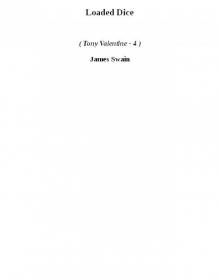 Loaded Dice tv-4
Loaded Dice tv-4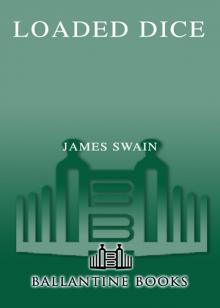 Loaded Dice
Loaded Dice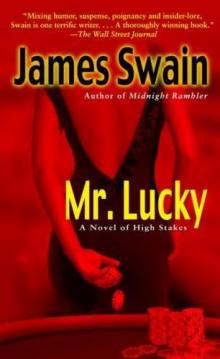 Mr. Lucky tv-5
Mr. Lucky tv-5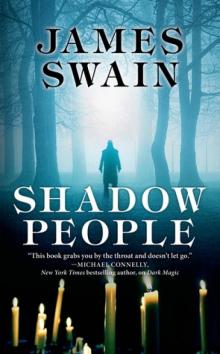 Shadow People
Shadow People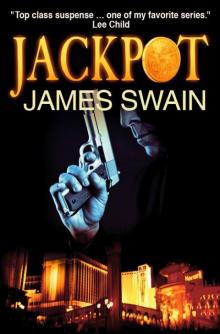 Jackpot tv-8
Jackpot tv-8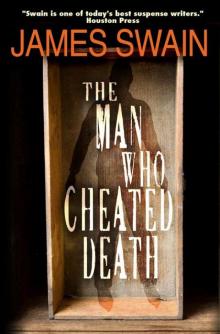 The Man Who Cheated Death (Vincent Hardare)
The Man Who Cheated Death (Vincent Hardare)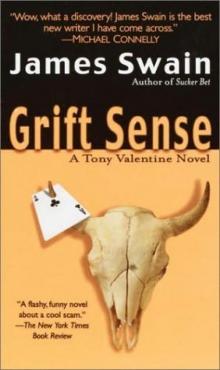 Gift sense tv-1
Gift sense tv-1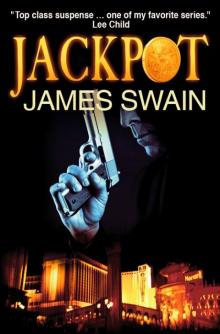 Jackpot (Tony Valentine series)
Jackpot (Tony Valentine series)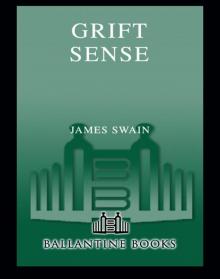 Grift Sense
Grift Sense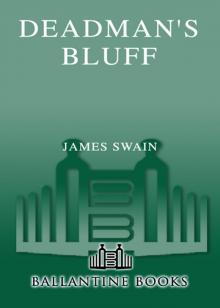 Deadman's Bluff
Deadman's Bluff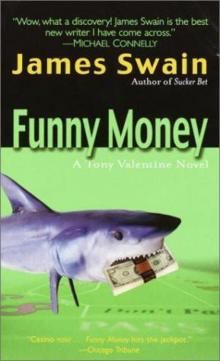 Funny Money tv-2
Funny Money tv-2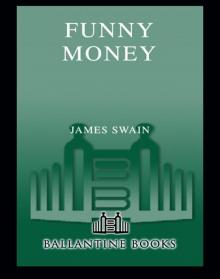 Funny Money
Funny Money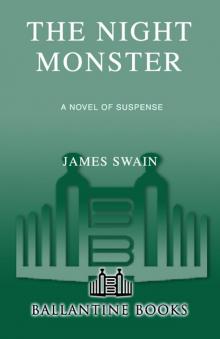 The Night Monster
The Night Monster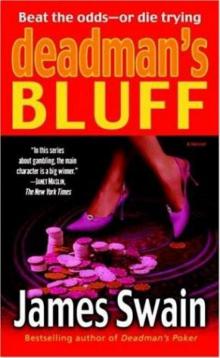 Deadman's Bluff tv-7
Deadman's Bluff tv-7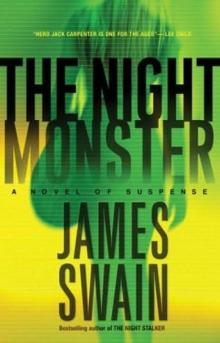 The Night Monster jc-3
The Night Monster jc-3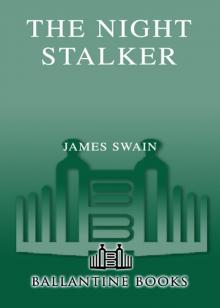 The Night Stalker
The Night Stalker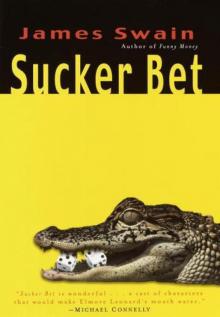 Sucker Bet tv-3
Sucker Bet tv-3